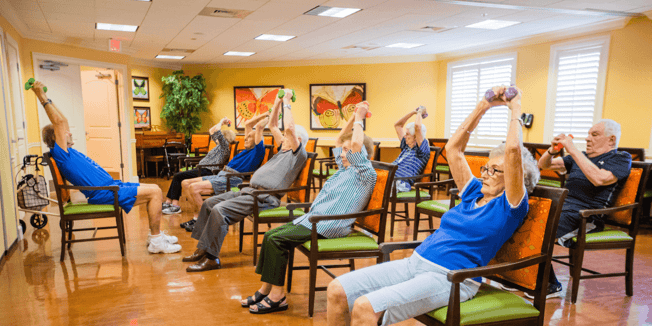Compare Memory Care programs for families seeking compassionate support.
Assisted Living: a Compassionate Setting for Elders With Memory Obstacles
Helped living facilities significantly work as thoughtful settings customized to the one-of-a-kind demands of elders facing memory difficulties. By supplying customized care and structured routines, these areas not just boost cognitive feature however also foster emotional links, lowering seclusion amongst homeowners. Specialized approaches, such as music therapy and reminiscence techniques, are employed by qualified personnel to help with deeper communication. Nevertheless, the efficiency of these treatments commonly pivots on the participation of households in the care procedure, prompting a more detailed evaluation of just how this joint effort influences end results for both homeowners and liked ones.
Comprehending Memory Obstacles
Understanding memory obstacles is necessary for offering effective like elders facing cognitive decline. Memory disabilities, which can show up as forgetfulness, confusion, or trouble recalling current events, are usually signs of problems such as Alzheimer's disease or other types of mental deterioration. These challenges can considerably influence a senior's capability to execute everyday jobs, maintain social connections, and take care of personal security.
Recognizing the different stages of cognitive decrease is crucial for caretakers and medical care professionals. Early-stage amnesia might involve moderate lapse of memory, while mid-stage decline can result in extra obvious disorientation and complication. In late-stage mental deterioration, people might shed the capacity to communicate efficiently, calling for thorough support and understanding from caregivers.
This necessitates a compassionate method to care that prioritizes the emotional health of the person. Inevitably, a deep understanding of these difficulties is essential to providing caring and effective care for elders encountering cognitive decrease.
Benefits of Assisted Living
Assisted living deals countless benefits for senior citizens with memory challenges, giving a supportive environment that cultivates self-reliance while ensuring security and treatment. Among the primary advantages is the day-and-night supervision and support offered, which aids mitigate dangers connected with memory-related concerns. Assisted Living. This continuous assistance enables elders to participate in everyday tasks without the worry of crashes or complication
Furthermore, assisted living centers typically provide organized routines that can boost cognitive feature and stability. These regimens help homeowners feel even more protected and reduce anxiousness, as they know what to anticipate every day. Social communication is one more substantial benefit, as these settings motivate links among homeowners, promoting psychological well-being and lowering feelings of isolation.
Additionally, aided living team are educated to recognize the one-of-a-kind needs of seniors with memory challenges, permitting customized care plans that deal with private preferences and demands. This customized strategy not only boosts the high quality of treatment however also encourages seniors to preserve a feeling of autonomy. Generally, assisted living acts as a caring service, balancing the requirement for assistance with the need for self-reliance in the lives of elders facing memory challenges.
Specialized Treatment Approaches
Applying specialized treatment strategies is crucial for properly sustaining elders with memory difficulties. One essential method is person-centered care, which emphasizes the relevance of recognizing each homeowner's life background, preferences, and values.
Another important strategy involves using cognitive excitement therapies. Tasks designed to boost memory recall, urge social interaction, and promote imagination can considerably impact residents' total wellness. Techniques such as memory therapy leverage individual memories to stimulate discussion and link, while songs therapy can stimulate feelings and memories, giving comfort.

Producing a Helpful Neighborhood
(Dementia Care Charlotte)A helpful area plays an important function in enhancing the lives of seniors with memory challenges. Such a neighborhood cultivates a setting of understanding, compassion, and support, which is essential for individuals facing cognitive problems. By developing a network of assistance, assisted living facilities can substantially boost the top quality of life for residents.
Central to a supportive area is the existence of qualified team that are sensitive to the one-of-a-kind requirements of seniors with memory problems. These professionals reference not only offer vital treatment however additionally involve homeowners in purposeful tasks that boost cognitive feature and advertise social communication. Programs that urge engagement in group workouts, arts and crafts, or memory games can enhance both physical and mental well-being.
Moreover, a supportive area advertises solid links amongst citizens. Motivating friendships and peer support helps to reduce feelings of seclusion and cultivates a feeling of belonging. Routine get-togethers and common dining experiences can further reinforce these bonds, developing an ambience where senior citizens feel valued and recognized.
Involving Families in Care
Involving family members in the care procedure is crucial for giving detailed support to seniors with memory obstacles. Household members often function as essential advocates, providing understandings right into the person's choices, background, and routines that can enhance customized care. By including them in conversations and care preparation, helped living facilities can develop an extra all natural approach that resonates with the resident's demands.

Motivating family members to get involved in treatment not only enhances the well-being of the senior however likewise gives psychological support to relative. Involving households in care cultivates a feeling of area and belonging, making certain that seniors feel connected to their loved ones. Inevitably, a collaborative technique to care enhances the lives of both citizens and their households, producing a compassionate and helpful setting that promotes dignity and regard.
Conclusion
In conclusion, helped living serves as an essential resource for senior citizens experiencing memory obstacles, supplying personalized care tailored to individual needs. By involving households in the care process, helped living produces a detailed assistance network, eventually enhancing the lives of citizens and their liked ones.